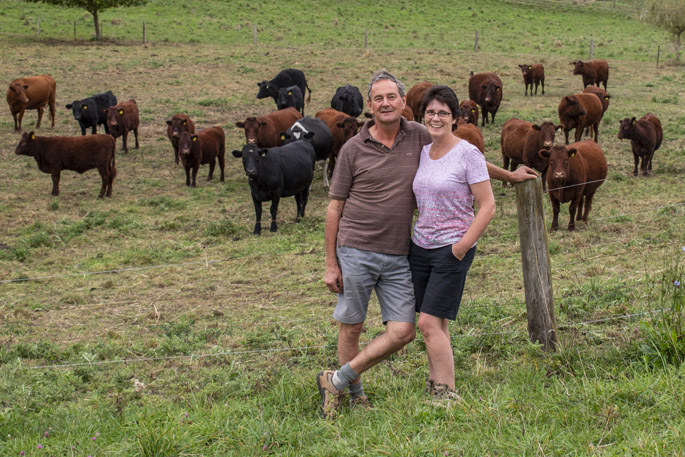“My only wish is that I had started doing this when I was younger” is the one regret of organic beef farmer Steve Harris.
Steve and his wife Angela wholeheartedly changed the way they farmed in 2007, when they moved to their 46ha Horahora farm in the Waikato. Immediately applying organic principles, they worked through the three-year process to become fully USDA organically certified in 2011.
The Harris family emigrated from the United Kingdom in 1988, after both falling in love with New Zealand on extended visits. They did poultry farming, contract milking, and then bought their first farm in 1993. Three farms later they came to Horahora to dairy farm.
Steve firmly believes that agricultural chemical use in the 1960s and 1970s led to the subsequent ill health of close family members. “I’d always had my eye on farming organically, and felt that there was a healthier way to farm,” says Steve.
“The severe drought of summer 2007/2008 was also a wake-up call as how to safeguard future tough seasons.”
A lightbulb moment
Steve and Angela milked 90 cows, supplying Fonterra with organic milk. They milked British Friesian type cattle.
“A turning point came in 2015 when the farmer who grazed our heifers decided to drop the organic status of his land,” says Angela.
“We were also at the point where our effluent and refrigeration systems needed upgrading, which was silly money at our stage in life,” says Steve.
Seeing a niche for grazing organic dairy heifers, the couple decided to make the switch from dairying to grazing. They now graze 50 per cent of the farm with heifers from three other organic farms.
The rest of the farm is grazed by the couple’s own cows, as part of their new project.
Wickton Red Devons
Steve had always been aware of Red Devon cattle, but an article in ‘Acres USA – The Voice of Eco-agriculture’ emphasised the ability of the breed to perform well in organic conditions.
Red Devons, with their deep ruby red, curly coat, are a traditional breed which fleshes easily, to produce quality, grass-fed beef. They are very efficient foragers and adaptable to a range of conditions.
After the dairy herd was sold, an initial group of Red Devon heifers, from the Woodlands Herd at Waihi, were added to the eight remaining dairy cows on the farm. Additions were made from four other herds.
One cold winter’s day Croyde, a five-year-old Woodlands bull, arrived from Gisborne via ute-and-trailor. Wickton Red Devons became a reality, with the stud name borrowed from an ancestor’s beef herd in the 1900s.
“To be organic, a beef calf has to be born from a cow or heifer that has been on the property more than three months prior to the birth,” says Steve.
The 30-cow herd is now more than 70 per cent pedigree Red Devons. And 80-plus beef cattle are currently grazed as well as 73 organically certified dairy heifers.
Pasture management
Organically certified minerals are put through the water after pre-mating blood testing identifies what may be required.
While Wickton uses the services of Homeopathic Farm Support in Hamilton for animal health remedies “we also vaccinate against Lepto, as that has human consequences,” says Steve.
The farm is bordered by the Waikato River, and has alluvial sand soils 1m deep over river bed metal, with six to seven inches of top soil.
Steve uses organically certified slow release fertiliser. Advice is taken from their Kiwi Fertiliser representative, Gerald Lane, following bi-annual soil tests.
Steve has introduced pasture diversity, using in excess of 15 varieties of organically-approved seed, and is tackling one of the issues on the farm – run-off through the sandy soils.
“We’re aiming for a diverse root system to sequester nutrients in a biologically vibrant soil,” says Angela.
Steve endeavours to ensure the soil has “armour” – leaving higher post-grazing residuals to assist with storing carbon, and building organic matter, through harvesting solar energy. An added bonus is cooling the soil in summer and warming it in winter.
More specimens and fruit trees have been planted around the property, both to provide shade, and diversity.
At peak growth times of the year, the Wickton herd and dairy heifers can be seen grazing in knee-high pasture.
Organic lifestyle
Both Angela and Steve are passionately committed to their organic lifestyle, and the upkeep of the land. The book that set them on their journey is ‘Out of the Earth’ by Louis Bromfield. Steve in particular is very well read, collecting and eagerly reading books from all eras.
They also belong to the Organic Dairy and Pastoral Group, where knowledge-hungry farmers share ideas and experiences.
A borrowed expression Steve uses to keep himself focused is: “If your farm looks like a golf course, you should be charging green fees”.



0 Comments
Leave a Comment